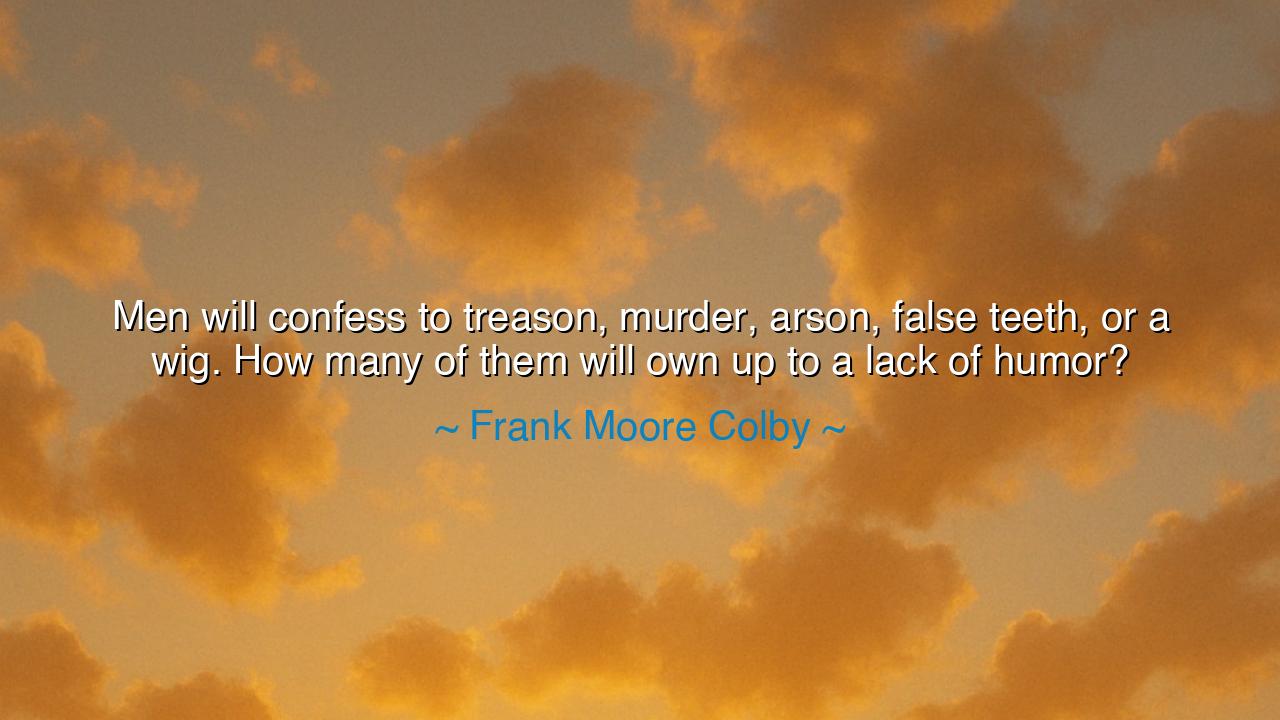
Men will confess to treason, murder, arson, false teeth, or a
Men will confess to treason, murder, arson, false teeth, or a wig. How many of them will own up to a lack of humor?






The words “Men will confess to treason, murder, arson, false teeth, or a wig. How many of them will own up to a lack of humor?” by Frank Moore Colby are not a jest, but a mirror — a mirror that reflects both pride and fragility in the human soul. In these few words, Colby exposes a universal truth: that to lack a sense of humor is not merely to be dull, but to be incomplete. Men will admit to crime, to vanity, to weakness, but they will never confess to lacking laughter, for to do so would be to confess to a deficiency of spirit — a failure not of intellect, but of humanity itself.
Colby, a scholar and essayist of sharp wit, wrote during an age of refinement and irony — a time when humor was considered not only entertainment but evidence of wisdom. To have humor was to have perspective, to see the world’s absurdities without being consumed by them. It was a mark of civility and intellect, a bridge between pride and compassion. And so, when he asks how many will admit to lacking it, he unmasks the hypocrisy of the proud: we would rather be thought sinful than humorless, for sin at least is human — but humorlessness is barren, the sign of a closed heart.
There is a deep psychology in his words. To laugh — truly laugh — is to surrender control, to let go of the armor we wear before the world. Those who cannot laugh often fear vulnerability; they guard their dignity so fiercely that joy itself cannot enter. Thus, humor becomes not just a social gift, but a spiritual test — proof that one can accept imperfection, in oneself and in others. A man may wear false teeth, or even false virtue, but if he cannot laugh, he reveals a soul that has grown rigid and afraid of life’s music. Colby’s insight pierces through time: laughter is not decoration; it is evidence of aliveness.
History offers many examples of this truth. Abraham Lincoln, even in the darkest days of war, used humor not to escape sorrow, but to master it. His jokes, gentle and self-deprecating, softened the hearts of enemies and comforted the weary. He knew that laughter is a weapon of peace — that a nation which could still laugh could still hope. In contrast, tyrants and zealots, from the ancient despots to the modern dictators, have always feared humor. They punish mockery because it reveals their weakness. Laughter unmasks false power. It is the voice of freedom — light enough to float, strong enough to pierce.
Colby’s phrase “false teeth or a wig” also holds symbolic meaning. These are masks — signs of human vanity, the desire to preserve appearances. We are willing to admit to artifice, to wearing disguises, yet we cannot admit to lacking the one quality that removes all disguise: humor. For humor, unlike wit or charm, cannot be faked. It arises from honesty. The one who laughs sincerely has seen through pretension — his own and others’ — and smiles at it. The humorless man, by contrast, clings to image, terrified that laughter will undo him. And indeed, it will — but only to rebuild him anew, freer and wiser.
In Colby’s observation lies a paradox: humor is the most human of gifts, yet the one most difficult to confess missing. For it requires humility — the willingness to look ridiculous and to find grace in the ridiculousness. A man without humor is like a temple without light: imposing perhaps, but lifeless. To possess humor is to carry a flame against the darkness of pride, to remember that even sorrow can be softened by perspective. Those who laugh well do not mock the world; they redeem it.
And so, my friends, remember this teaching: do not fear laughter, even when it humbles you. Laugh at yourself before the world laughs at you, and you will never be its prisoner. Cultivate humor not as an ornament, but as armor — the kind that shields with gentleness, not cruelty. For humor is not mere amusement; it is insight, forgiveness, and strength woven together. As Frank Moore Colby teaches, one may hide vanity, deceit, even guilt, but never the absence of laughter. To laugh is to confess our shared imperfection — and in that confession, we find our most perfect humanity.






AAdministratorAdministrator
Welcome, honored guests. Please leave a comment, we will respond soon